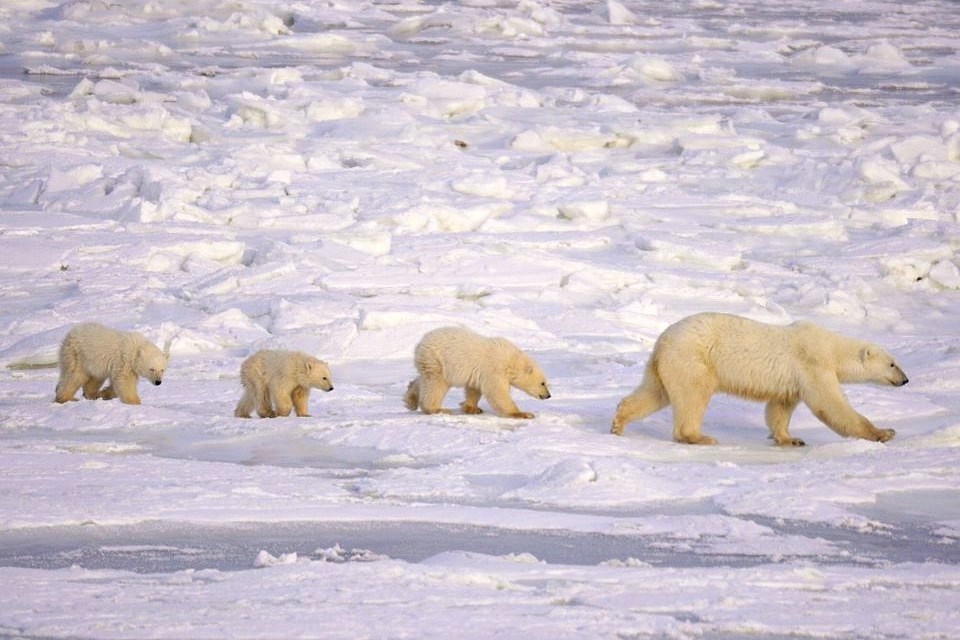There are some perks to working in Churchill, Man., if you can handle the very low temperatures and the very high winds.
After all, it is the Polar Bear Capital of the World, and it keeps Kelli Sroka coming back for more. The seasoned wildlife tour guide with Maligne Adventures recently returned after spending two months in the northeast of Manitoba where the town of barely 900 sits on the shores of Hudson Bay.
For many years, a trend has developed where Jasperites finish their summer here and then go to Churchill for its polar bear season in October and November. This was Sroka’s second year.
“It’s a really cool experience,” she said, recalling that her first experience in 2022 saw temperatures drop to –50 C with the substantial wind chill considered.
“There, there’s no mountains to block the wind. There's no trees. There’s nothing to block the wind. It’s just able to blow right through. I've never felt wind like that before.”
Conditions brought on by El Niño made the weather more manageable in 2023. She didn’t have to wear snow pants the entire time.
“It was really warm. Not good for the bears. The thing is the bears are all waiting at the shore for the ice to form in Hudson's Bay. Once the ice forms, then the bears are gone. They go out on the ice; we don't see them again until next year,” she said.
“Unfortunately, if tourists book their trip too late in the season, there's a chance they're going to come up to Churchill and we're going to take them out to see bears, but if the ice has already formed, the bears are gone, and there's nothing we can do to help the tourists see a bear.”
When she left Churchill in the middle of November, the ice still had not even formed, which is unusually late. It's not a good sign, she said.
With the signs and impacts of climate change prevalent all around, she said the company that she worked for there does uphold and adhere to high ethical standards to minimize the effects of all those vehicles trekking with thousands of tourists through their habitat.
The tours last several days, but with that you can frequently see not only the polar bears (known locally as sea bears) but also caribou, arctic foxes, owls, wolves, ptarmigans, maybe even a sun dog. The Northern Lights are spectacular there, too.
While Churchill is also known as the Beluga Capital of the World, she didn’t see any of the marine mammals. That season is in July and August.
There are so many amazing and beautiful things to experience on these tours, and she offered one of her favourite moments. It took place at the “super remote” lodge facility, which she describes as a series of boxcars out on the tundra. Often, the polar bears are right in front of the window, which is convenient since you can’t step outside in the protected environment.
“It was sunrise one morning, and this polar bear was just sitting there watching the sunrise,” she said.
“He just looked like he was enjoying the sunrise more than any of us. It was a beautiful sunrise, but it was just really cool to see this bear so unbothered by any kind of human activity. It just seemed to really be enjoying its natural environment as well. It was just the most beautiful thing.”
She took a video record of what she calls “the coolest, most beautiful moment of maybe her whole year.”
“It's hard to put that into words. It was just a really special moment to watch this bear enjoying its natural surroundings and probably hoping for the sea ice to form soon.”
At the same time, she remained conscious of the moral struggle. These tours bring people in from all over the world, which is already a huge carbon footprint.
Polar bears are already considered a threatened species that is vulnerable to the many undue circumstances that affect its survival, habitat loss and availability of food sources being the main factors. These are heavily and negatively impacted by the effects of climate change, pollution, and energy development.
Sroka said these tours can be one of the last chances for people to see polar bears.
“You find yourself, especially as a guide, feeling a bit … I guess, I don't even know the word for this: just feeling a little bit sad. And it's a bit ironic because you're really trying to show people this beautiful thing, but it's because of us that the beautiful thing is losing its habitat, and then we're accelerating that by pumping up tourism in the area.”
Thankfully, she reported, the bears mostly appeared healthy with lots of cubs. One mama bear had three cubs, which was “super special” enough to be considered the talk of the town for Churchill.
Editor's note: The original story included a trademarked name that has been removed from this version.




